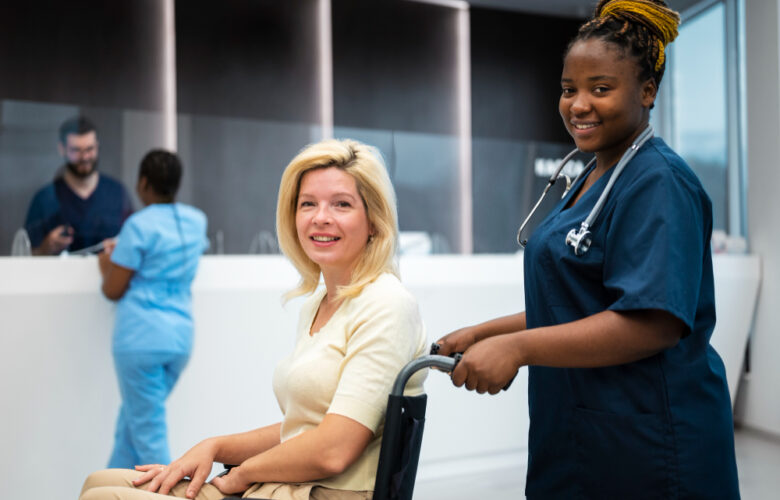In the fast-paced world of healthcare, nurses play a pivotal role in ensuring the well-being of patients. For travel nurses, this responsibility takes on an added dimension. They provide vital care in ever-changing environments, often far from their comfort zones. This article will explore the importance of constant learning and continued education for travel nurses.
Adapting to varied healthcare settings
One of the critical aspects of travel nursing is the ability of travel nurses to adapt to diverse healthcare settings. One of the unique challenges for travel nurses is the ability to quickly adapt to the different characteristics and needs of each healthcare facility they move to. This plurality of clinical contexts they must adapt to is essential for their accomplishment. Whether in crowded city hospitals, tranquil rural clinics, specific care units, or other healthcare scenarios, travel nurses need medical versatility and adaptability to work effectively in multiple situations.
Electronic health records (EHRs) are an essential component of providing care to patients, but not all hospitals use the same system of EHR. Travel nurses must be competent with EHRs and able to quickly pick up new skills and techniques for every new assignment. Flexibility is essential to proper documentation and efficient patient record management.
Patient-centered care is a fundamental nursing practice, and travel nurses often care for patients from different cultural backgrounds, socioeconomic classes, etc. Their capacity to accommodate such differences and personalize their care builds trust and improves patient satisfaction, which is essential to securing good health outcomes.
Collaboration is another critical component in healthcare; often, healthcare providers are expected to be able to assimilate into an established team quickly. Adaptability means technical abilities, social aptitudes, communication, collaboration, and leadership abilities. The ability to adjust team dynamics will allow for smooth cooperation.
Staying current with medical advancements
In the constantly evolving world of healthcare, this is particularly important for a travel nurse who must always remain up-to-date with medical developments. Travel nurses transition through various healthcare settings and must be aware of new trends and innovations. It’s no small task to make such an ongoing commitment to education, and it’s essential for several reasons.
Medicine is an ever-changing area. New treatments, medicines, and medical technologies are constantly introduced. The travel nurse must keep up with these trends to provide top-notch patient care. Whether it’s some new surgical technique, a new drug discovery, or anything else, staying up-to-date allows the travel nurse to assimilate this advancement and implement it in practice for the betterment of patients.
Not only do RNs often need to keep up with continuing education to maintain their nursing licenses and certifications, but travel nurses often own licenses in various states or countries with the need for renewals or relicensing. Continuing education allows nurses to comply with such rules and qualify for assignments across geographical territories. If a travel nurse fails to meet these standards, it might restrict their career choices and prevent them from practicing in diverse healthcare environments.
Clinical skill is central to nursing practice, and travel nurses must remain sharp. They can fine-tune their clinical skills with up-to-date medical knowledge, becoming competent to deliver evidence-based and practice-recommended care. It is a win-win situation for patients because it is up-to-date care and a plus for travel nurses to be more competitive in finding jobs.
Moreover, hospitals look for nurses who are aware of current medical advancements. Hospitals and clinics want to give the best care possible to their patients, and having travel nurses who are up to date with all the latest information can help to achieve this aim. Since travel nurses are current in medical innovations, they tend to have more job opportunities and are more in demand from healthcare organizations, boosting their careers.
Meeting licensing and certification requirements
Being licensed and certified is one of the most crucial duties of travel nurses. While this assurance may sound more like an administrative exercise than anything else, it has considerable consequences for the individual nurse and patient care outcomes for all parties. Traveling nurses can work across state and even international borders in their jobs and must deal with a labyrinthine network of licensing and certification requirements.
If you are passionate about exploring different places and consider a lifestyle involving constant travel, you might find travel nursing appealing. Even if you possess a bachelor’s degree without prior nursing experience, Elmhurst University offers convenient options such as an online accelerated BSN and an online direct entry MSN in nursing, which will equip you with the necessary knowledge and skills to embark on a nursing career. Suppose you are considering a second career in nursing and wish to learn more. In that case, consider the program information from Elmhurst University, which includes details on travel nursing requirements.
Upon completing these accelerated nursing entry programs, you will be well-prepared to take the NCLEX-RN exam, a crucial requirement for obtaining your RN license and a prerequisite for pursuing a career as a travel nurse.
First, nursing permits and accreditations are the lawful endorsement of a medical attendant to rehearse their calling. Each region, whether a state within the US or another country, will have laws governing nursing practice. Travel nurses require the appropriate licenses and certifications for every place they will be working. Failure to adhere to these requirements could result in legal consequences such as fines, penalties, and even the suspension of their right to practice nursing.
In addition to this, meeting the licensing and certification requirements is necessary for patient safety. These rules ensure that clinicians meet at least basic proficiency and ethical standards. Patients trust their healthcare providers to provide safe, competent care, valid licenses, and credentials to protect against incompetent or unqualified practitioners. Travel nurses must abide by these rules and thus maintain the dignity of the nursing industry.
Furthermore, meeting licensing and certification requirements is crucial for career mobility and job opportunities. Travel nurses who maintain active, unrestricted licenses and certifications in multiple jurisdictions are more attractive candidates for assignments in various locations. It provides them with greater flexibility and a broader range of job options, potentially leading to enhanced career advancement and financial rewards.

Enhancing clinical competence
Developing clinical skills is an ever-evolving obligation at the heart of a travel nurse’s professional development. With healthcare careening down a new path at an alarming rate, knowledgeable and skilled clinicians are no longer just friendly to have; they are required to deliver quality patient care. Here’s why the pursuit of clinical excellence is vital for travel nurses.
Clinical skill is the base of all nursing practice, and being excellent in numerous medical office environments as a travel nurse is essential. These configuration settings could include varying degrees of expertise, patient groups, and treatment protocols. It’s the ability to be effective in all situations that matters most. Improving clinical skills prepares travel nurses with the necessary competencies and understanding to deliver care adhering to evidence-based practice and the best patient outcomes.
Adhering to clinical guidelines and best practices is a core feature of clinical competency. With healthcare constantly evolving, new research findings and therapy modalities are seemingly everywhere. Travel nurses must take active steps to keep up with these changes. Continual education, participating in conferences, and obtaining higher-level certifications can aid nurses in increasing their clinical knowledge. Hence, they fulfill the demands of their profession and improve their ability to deliver the utmost service to their patients.
Another critical aspect of clinical competence is crisis management. In the rapidly evolving world of healthcare travel, nurses may encounter emergencies or unforeseen circumstances requiring immediate and decisive action. A good nurse stays composed throughout the chaos, evaluates the issue, and takes measures accordingly. Improving clinical skills involves building the ability to respond intelligently and quickly in critical situations, helping safeguard patients.
Keeping clinical competency can also be a license and certification maintenance or renewal criterion. Nursing boards and certifying organizations often require nurses to fulfill a specific number of continuing education credits to remain current. These meetings are a requirement of being a professional and make sure travel nurses remain applicable for jobs in various facilities.
Improving clinical skills goes beyond technical skills. It includes good communication, collaboration with others, and championing patients. With travel nursing, you typically work with a variety of different caretaker teams, so you need to be able to adjust your team dynamics accordingly. Good communication and cooperation lead to coordinated care and improved patient health outcomes. Moreover, standing up for patients and ensuring they receive the care they need is part of clinical competence, championing patient-centric care.
Cultural competency and patient-centered care
Cultural humility and patient-centered care are essential for travel nursing, especially in multicultural settings. They are not just ancillary skills but fundamental to providing care that honors every patient’s uniqueness and specific needs.
Cultural competency refers to being aware of, respectful of, and able to work effectively with people from different cultures. For travel nurses, in particular, this skill is imperative as they often come across patients of different cultures, languages, and traditions. By becoming familiar with and appreciative of different cultures, travel nurses can navigate these cultural barriers, establish trust with clients, and deliver care that respects the values and beliefs of the people they care for. These include understanding the cultural nuances of care choices (e.g., how patients and their families engage with HCPs and perceive illness and its remediation).
On the other hand, patient-centered care is a philosophy that puts the patient at the core of the healthcare experience. Patient-centered care means a model of care delivery in which healthcare providers partner with patients and their families to help navigate the healthcare system and coordinate all aspects of care according to individual needs and priorities, recognizing that care must be respectful of and responsive to each patient. Travel nurses need to know that patient-centered care is a vital mode of delivery and promotes teamwork, collaboration, and shared decision-making with patients.
Communication is essential in culturally responsive care and patient-centered care. The travel nurse has to accommodate language and cultural communication differences, such as asking the interpreter to share visual aids or considering the patient’s emotions. Additionally, traveling nurses must recognize non-verbal language, which varies from culture to culture.
It also means appreciating and respecting various traditions and beliefs within a community. Travel nurses must know that patients might have alternative opinions regarding their diagnoses, illnesses, treatments, or care. If those attitudes are considered, travel nurses could build trust and establish rapport with the patients, leading to beneficial health outcomes.
In patient-centered care, travel nurses should proactively involve patients in planning their care and decisions. It includes explaining treatment options effectively and in plain language, considering patients’ desires, and obtaining informed consent. As travel nurses, you can also educate patients and give them the information and resources they need to feel confident in the decisions they make about their health.
Embracing technological advancements
Being open to new technology is essential to the journey of travel nurses in today’s healthcare environment. Technology has touched upon almost every aspect of patient care, and travel nurses need to know how to use them all and be open to learning new ones. In a few significant points, the essence of the necessity to adopt technology is evident.
Secondly, technology improves the efficiency and precision of healthcare. It does everything from EHRs that record and store patients’ information safely to barcode/RFID medication administration systems that significantly decrease medical errors. But suppose we embrace and leverage these technologies as travel nurses. In that case, we can dramatically improve the efficacy of patient care and diminish the chances of mistakes, leading to superior results for the patient.
In addition, telehealth and remote monitoring technologies have seen an uptick, with a particular emphasis since the COVID-19 pandemic. With the right digital tools, travel nurses can hold virtual patient evaluations, work with experts remotely, and monitor significant indicators remotely. Knowing how to utilize telehealth platforms and remote monitoring devices is essential today for patient care.
A vital advantage of technology is access to information itself. As travel nurses, you can access medical knowledge from evidence-based guidelines to drug databases and medical literature. It allows nurses to make accurate clinical decisions and deliver state-of-the-art patient care.
In addition, mobile apps and point-of-care tools have become essential tools for travel nurses. They support dosing calculations, perform real-time medication interaction checks, and deliver clinical resources for point-of-care decision-making. In accepting and harnessing these tools, travel nurses enhance their decision-making processes and, thus, the patient’s outcomes.
Moreover, technology is critical to patient engagement and education, too. With interactive apps and telemedicine visits, travel nurses can engage patients in their care. These technologies may enhance patient comprehension of diagnosis and management options and patient instruction related to self-care, thereby enhancing health outcomes.
On top of this, in the modern day, the security of healthcare (patient confidentiality) and the privacy of patient records through proper handling of ePHI or HIPAA compliance mean that travel nurses need to know their stuff.
On top of that, travel nurses frequently practice in institutions that use different EHR platforms and technologies. It’s crucial to be able to adapt to different technological environments swiftly. One of the most essential qualities travel nurses must have is the ability to adjust quickly to new techniques and technologies.

Risk management and legal compliance
Risk management and legal compliance are fundamental practice areas for a travel nurse. Given how regulated and sensitive the healthcare environment is, it is more than a suggestion; it is imperative to abide by these principles to provide the best patient care possible and safeguard both the safety of the nurse and the healthcare establishment against legal problems.
First and foremost, healthcare is heavily governed and is required to abide by numerous local, state, and federal laws, rules, and standards. Travel nurses must be educated on these legal requirements to provide care within legal limits. Compliance is mandatory for protecting patients, ensuring professional accountability, and preventing any legal complications.
Furthermore, following regulatory and clinical standards is vital for ensuring the security of patients. Patient safety is essential, and many rules exist for health care, like medication administration, infection control, and patient privacy. These rules can ensure that travel nurses are not at risk for slips or mistakes that might harm patients.
Second, risk management is an active strategy for uncovering, reducing, or avoiding healthcare-related risks and exposures. Travel nurses must have heightened awareness about the dangers they face in their practice. It involves identifying problems compromising patient safety, such as patient falls or medication errors, and documenting concerns insufficiently. Travel nurses become more involved in risk management, making the environment safer for patients.
In the event of any adverse event or medical error, proper risk management practices involving timely reportage and documentation are essential. Incident reporting protocols should be followed; risk management teams should collaborate when conducting investigations where appropriate, and corrective actions will be implemented. Transparency in communication and comprehensive documentation are also essential for risk mitigation.
Compliance also extends to patient consent, privacy, and informed decision-making. Travel nurses must verify that patients know their therapeutic choices and the risks involved and accept these conditions if the law or policy dictates. Honoring the patient’s autonomy and privacy is more than just legally mandated; it is the moral thing to do.
Conclusion
Travel nurses confront unique challenges in the constantly adapting field of healthcare. But by adopting continuous learning and further education, they can overcome this challenge and excel in their profession. Education is vital for travel nurses. From staying current in technology and regulatory matters to advancing leadership abilities and promoting self-care, education is essential to success as a travel nurse. It helps them in their career, but it also protects the health of the patients they are treating.
Featured Image by https://www.freepik.com
